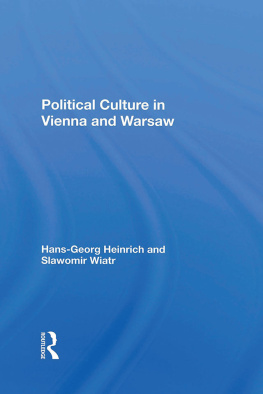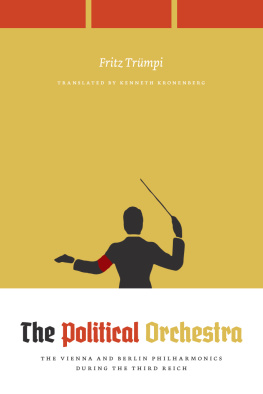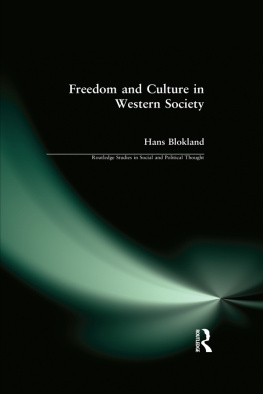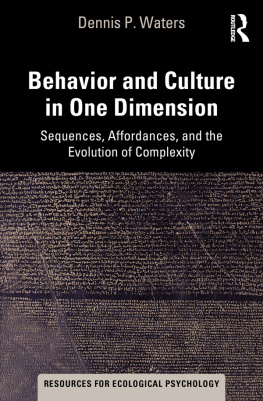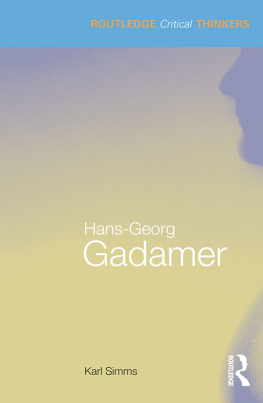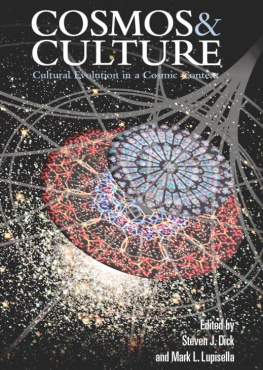Hans-Georg Heinrich - Political Culture in Vienna and Warsaw
Here you can read online Hans-Georg Heinrich - Political Culture in Vienna and Warsaw full text of the book (entire story) in english for free. Download pdf and epub, get meaning, cover and reviews about this ebook. City: London, year: 2019, publisher: Routledge, genre: Science / Politics. Description of the work, (preface) as well as reviews are available. Best literature library LitArk.com created for fans of good reading and offers a wide selection of genres:
Romance novel
Science fiction
Adventure
Detective
Science
History
Home and family
Prose
Art
Politics
Computer
Non-fiction
Religion
Business
Children
Humor
Choose a favorite category and find really read worthwhile books. Enjoy immersion in the world of imagination, feel the emotions of the characters or learn something new for yourself, make an fascinating discovery.
- Book:Political Culture in Vienna and Warsaw
- Author:
- Publisher:Routledge
- Genre:
- Year:2019
- City:London
- Rating:4 / 5
- Favourites:Add to favourites
- Your mark:
- 80
- 1
- 2
- 3
- 4
- 5
Political Culture in Vienna and Warsaw: summary, description and annotation
We offer to read an annotation, description, summary or preface (depends on what the author of the book "Political Culture in Vienna and Warsaw" wrote himself). If you haven't found the necessary information about the book — write in the comments, we will try to find it.
Political Culture in Vienna and Warsaw — read online for free the complete book (whole text) full work
Below is the text of the book, divided by pages. System saving the place of the last page read, allows you to conveniently read the book "Political Culture in Vienna and Warsaw" online for free, without having to search again every time where you left off. Put a bookmark, and you can go to the page where you finished reading at any time.
Font size:
Interval:
Bookmark:

52 Vanderbilt Avenue, New York, NY 10017
2 Park Square, Milton Park, Abingdon, Oxon OX14 4RN
Product or corporate names may be trademarks or registered trademarks, and are used only for identification and explanation without intent to infringe.
Heinrich, Hans-Georg, Univ. Doz. Dr.
Political culture in Vienna and Warsaw/Hans-Georg Heinrich and Slawomir Wiatr.
p. cm.
Includes bibliographical references.
ISBN 0-8133-7818-4
1. Vienna (Austria)Politics and government. 2. Warsaw (Poland)Politics and government. 3. Political cultureAustriaVienna. History20th century. 4. Political culturePolandWarsawHistory20th century. I. Wiatr, Slawomir, 1960- . II. Title.
DB885.H45 1991
320.9436'13dc20
CIP
Slawomir Wiatr, Warsaw
- FP Freiheitliche Partei sterreichs (Liberal Party of Austria)
- FRG Federal Republic of Germany
- GDR German Democratic Republic
- KOR Komitet Obrony Robotnikw (Committee of Workers' Defense)
- NKZ Neue Kronen Zeitung
- NZS Niezalezny Zwazek Studentw (Independent Students' Association)
- OPZZ Oglnopolskie Porozumienie Zwiazkw Zawodowych (National Agreement of Trade Unions)
- VP sterreichische Volkspartei (Austrian People's Party)
- PRON Patriotyczny Ruch Obrodzenia Narodowego (Patriotic Movement of National Revival)
- PUWP Polish United Workers' Party
- SDRP Social Democracy of the Republic of Poland
- SP Sozialistische Partei sterreichs (Socialist Party of Austria)
- TA Tenants' Association
- ZSL Zjednoczonna Strana Ludowa (United People's Party)
Introduction
Theoretical Considerations
Font size:
Interval:
Bookmark:
Similar books «Political Culture in Vienna and Warsaw»
Look at similar books to Political Culture in Vienna and Warsaw. We have selected literature similar in name and meaning in the hope of providing readers with more options to find new, interesting, not yet read works.
Discussion, reviews of the book Political Culture in Vienna and Warsaw and just readers' own opinions. Leave your comments, write what you think about the work, its meaning or the main characters. Specify what exactly you liked and what you didn't like, and why you think so.

